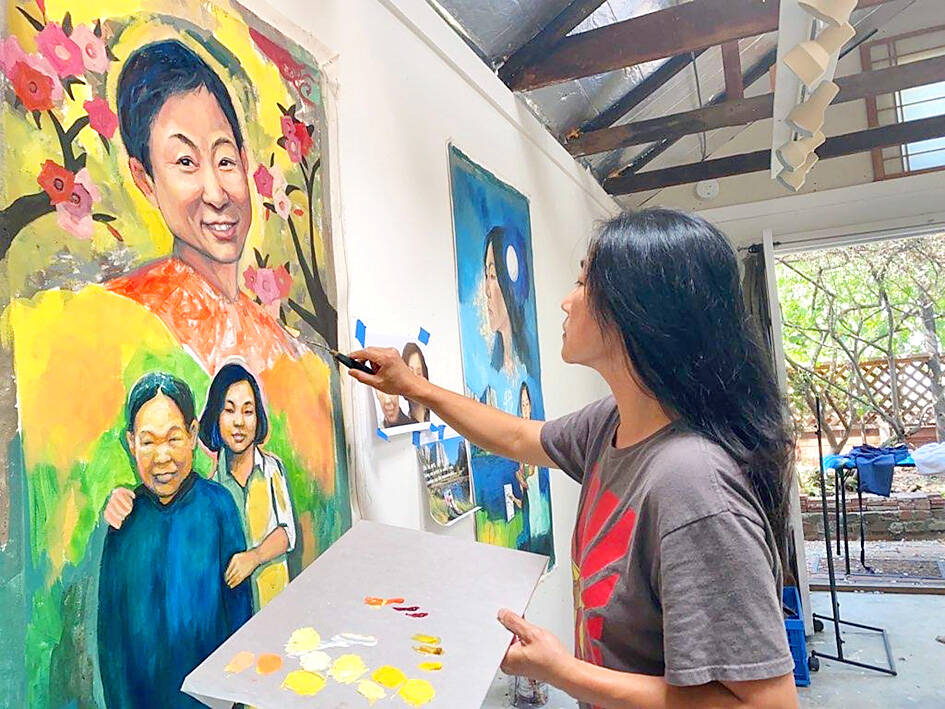Seventeen years after making San Francisco her home, Taiwanese painter Moo Tsung-wei (牟宗瑋) has not forgone her desire to speak for female immigrants in the US.
Moo’s drive to document life after emigration can be seen in the seven portraits of women from Taiwan, Canada, China, Haiti, India, Japan, Mexico and South Korea produced for an exhibition hosted by the San Francisco Public Library.
The subjects in Mothers and Daughters — Generations of Female Immigrants, which runs through March 30, are personally known to Moo, and include herself, as well as her mother and grandmother.

Photo courtesy of Moo Tsung-wei
Pointing to a portrait of her mother and grandmother in traditional garb, Moo said that the exhibition honors and acknowledges the contributions of female immigrants from different parts of the world to the US.
Since childhood, she has been deeply inspired by her mother and grandmother, both immigrants, Moo said, adding that their influence has led her art to frequently center on women.
“My grandma [came from such a poor family that she] wasn’t given a name. After World War II broke out, she fled Shandong Province in China to North Korea. She then escaped on foot to South Korea, where she gave birth to my mother,” Moo said.
Moo said that her mother, who moved to Taiwan as part of an arranged marriage, was the one who had encouraged her to pursue art in the US.
Moo, a former Taipei-based advertising art director, dedicated herself to creative pursuits, emigrating to San Francisco in 2005 and enrolling in fine art and ceramics courses in the city.
Moo’s artwork has been honored by a string of organizations, including the San Francisco Municipal Transportation Agency.
The seven portraits on display at the library are part of the San Francisco Arts Commission’s programs to support local artists.
“We believe it’s very important to bring all kinds of different stories to the library,” San Francisco Public Library director of communications Kate Patterson said.
“This particular body of work, which speaks so intimately of the immigrants’ experience and the generational experience of people who immigrated from other countries, is so important because so many people in San Francisco were not born in San Francisco, and came from other places and made this their home,” she said.
Moo said she spent the past three years working on paintings that aim to share the stories of immigrant women, and relay their courage and strength to the world, particularly amid a rise in hate crime against Asian-American women during the COVID-19 pandemic.
“Sometimes when I’m walking down the streets, people would yell at me for being Asian. During the COVID-19 pandemic, I would wear masks and sunglasses and cover my hair and even fingers when I go out,” Moo said.
“But then I would think to myself: Why do I need to live like this? Being an immigrant is a choice, not a mistake. And we make great contributions to society,” she said.
Talking about the future, Moo said she would continue to create, and make the voice of social justice and parity be heard across the globe.

An undersea cable to Penghu County has been severed, the Ministry of Digital Affairs said today, with a Chinese-funded ship suspected of being responsible. It comes just a month after a Chinese ship was suspected of severing an undersea cable north of Keelung Harbor. The National Communications and Cyber Security Center received a report at 3:03am today from Chunghwa Telecom that the No. 3 cable from Taiwan to Penghu was severed 14.7km off the coast of Tainan, the Ministry of Digital Affairs said. The Coast Guard Administration (CGA) upon receiving a report from Chunghwa Telecom began to monitor the Togolese-flagged Hong Tai (宏泰)

EVA Air is prohibiting the use of portable chargers on board all flights starting from Saturday, while China Airlines is advising passengers not to use them, following the lead of South Korean airlines. Current regulations prohibit portable chargers and lithium batteries from check-in luggage and require them to be properly packed in carry-on baggage, EVA Air said. To improve onboard safety, portable chargers and spare lithium batteries would be prohibited from use on all fights starting on Saturday, it said. Passengers are advised to fully charge electronic devices before boarding and use the AC and USB charging outlets at their seat, it said. South

Hong Kong-based American singer-songwriter Khalil Fong (方大同) has passed away at the age of 41, Fong’s record label confirmed yesterday. “With unwavering optimism in the face of a relentless illness for five years, Khalil Fong gently and gracefully bid farewell to this world on the morning of February 21, 2025, stepping into the next realm of existence to carry forward his purpose and dreams,” Fu Music wrote on the company’s official Facebook page. “The music and graphic novels he gifted to the world remain an eternal testament to his luminous spirit, a timeless treasure for generations to come,” it said. Although Fong’s

WAR SIMULATION: The developers of the board game ‘2045’ consulted experts and analysts, and made maps based on real-life Chinese People’s Liberation Army exercises To stop invading Chinese forces seizing Taiwan, board gamer Ruth Zhong chooses the nuclear option: Dropping an atomic bomb on Taipei to secure the nation’s freedom and her victory. The Taiwanese board game 2045 is a zero-sum contest of military strategy and individual self-interest that puts players on the front lines of a simulated Chinese attack. Their battlefield game tactics would determine the theoretical future of Taiwan, which in the real world faces the constant threat of a Chinese invasion. “The most interesting part of this game is that you have to make continuous decisions based on the evolving situation,